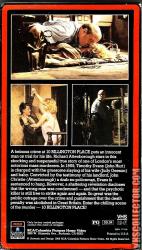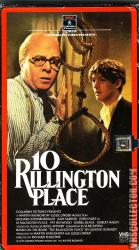10 Rillington Place
Catalog Number
60593
-
Primary Distributor (If not listed, select "OTHER")
Catalog Number
60593
Primary Distributor (If not listed, select "OTHER")
Release Year
Country
N/A (NTSC)
N/A | N/A | N/A
N/A | N/A
10 Rillington Place (1971)
Additional Information
Additional Information
What happened to Ena and Geraldine and Beryl and Muriel and Rita and Ethel at 10 Rillington Place?
What happened to the women at 10 Rillington Place?
The true story of John Christie - the serial killer.
10 Rillington Place is the true story of British mass murderer John Reginald Christie, played with chilling "normality" by Richard Attenborough. Throughout the late '40s, Christie lures middle-aged women to his London flat promising to cure their ailments with nitrous oxide, then kills them, assaults their dead bodies, and buries them. One of his victims is Beryl Evans (Judy Geeson), who misguidedly comes to Christie seeking an abortion -- and in the process, not only loses her own life, but sets in motion a horrid sequence of events that threatens to endanger her husband as well.
10 Rillington Place is a 1971 British crime drama film, directed by Richard Fleischer who directed the 1968 film The Boston Strangler. 10 Rillington Place starred Richard Attenborough, John Hurt and Judy Geeson and was adapted by Clive Exton from the book Ten Rillington Place by Ludovic Kennedy.
The film dramatises the case of British serial killer John Christie, who committed many of his crimes in the titular London terraced house, and the miscarriage of justice involving Timothy Evans. Hurt received a BAFTA Award nomination for Best Supporting Actor for his portrayal of Evans.
The review in Variety wrote "Richard Fleischer has turned out an authenticated documentary-feature which is an absorbing and disturbing picture. But the film has the serious flaw of not even attempting to probe the reasons that turned a man into a monstrous pervert." Praise went to John Hurt for his "remarkably subtle and fascinating performance as the bewildered young man who plays into the hands of both the murderer and the police."[6] Vincent Canby of The New York Times described 10 Rillington Place as "a solemn, earnest polemic of a movie, one with very little vulgar suspense ... The problem with the film is very much the problem with the actual case, which involved small, unimaginative people."[7] Years later, Tom Hardy of the British Film Institute noted Attenborough's ability at "getting into the flesh of the paranoid and the distressed", describing the film as a "detailed account of life under the shadow of World War II [which] is powerful and compelling".[8]
In a 2009 review, the film critic J. Hoberman wrote, "More highly regarded these days than when it was released in 1971, Richard Fleischer's 10 Rillington Place is a grimly efficient treatment of a once-notorious case".[9] The same year, Keith Uhlich of Time Out gave the film a 5-star review and described it as an "underseen gem".[10]
In an interview with Robert K. Elder in his book The Best Film You've Never Seen, director Sean Durkin states that 10 Rillington Place “depicts this story the way that a piece of journalism might, as opposed to worrying about preconceived notions of what a film should achieve.”[11]
John Hurt received a BAFTA Award nomination for Best Supporting Actor.
Release Date: May 10, 1971
Distrib: Columbia Pictures
What happened to the women at 10 Rillington Place?
The true story of John Christie - the serial killer.
10 Rillington Place is the true story of British mass murderer John Reginald Christie, played with chilling "normality" by Richard Attenborough. Throughout the late '40s, Christie lures middle-aged women to his London flat promising to cure their ailments with nitrous oxide, then kills them, assaults their dead bodies, and buries them. One of his victims is Beryl Evans (Judy Geeson), who misguidedly comes to Christie seeking an abortion -- and in the process, not only loses her own life, but sets in motion a horrid sequence of events that threatens to endanger her husband as well.
10 Rillington Place is a 1971 British crime drama film, directed by Richard Fleischer who directed the 1968 film The Boston Strangler. 10 Rillington Place starred Richard Attenborough, John Hurt and Judy Geeson and was adapted by Clive Exton from the book Ten Rillington Place by Ludovic Kennedy.
The film dramatises the case of British serial killer John Christie, who committed many of his crimes in the titular London terraced house, and the miscarriage of justice involving Timothy Evans. Hurt received a BAFTA Award nomination for Best Supporting Actor for his portrayal of Evans.
The review in Variety wrote "Richard Fleischer has turned out an authenticated documentary-feature which is an absorbing and disturbing picture. But the film has the serious flaw of not even attempting to probe the reasons that turned a man into a monstrous pervert." Praise went to John Hurt for his "remarkably subtle and fascinating performance as the bewildered young man who plays into the hands of both the murderer and the police."[6] Vincent Canby of The New York Times described 10 Rillington Place as "a solemn, earnest polemic of a movie, one with very little vulgar suspense ... The problem with the film is very much the problem with the actual case, which involved small, unimaginative people."[7] Years later, Tom Hardy of the British Film Institute noted Attenborough's ability at "getting into the flesh of the paranoid and the distressed", describing the film as a "detailed account of life under the shadow of World War II [which] is powerful and compelling".[8]
In a 2009 review, the film critic J. Hoberman wrote, "More highly regarded these days than when it was released in 1971, Richard Fleischer's 10 Rillington Place is a grimly efficient treatment of a once-notorious case".[9] The same year, Keith Uhlich of Time Out gave the film a 5-star review and described it as an "underseen gem".[10]
In an interview with Robert K. Elder in his book The Best Film You've Never Seen, director Sean Durkin states that 10 Rillington Place “depicts this story the way that a piece of journalism might, as opposed to worrying about preconceived notions of what a film should achieve.”[11]
John Hurt received a BAFTA Award nomination for Best Supporting Actor.
Release Date: May 10, 1971
Distrib: Columbia Pictures
Related Links






Comments0
Login / Register to post comments